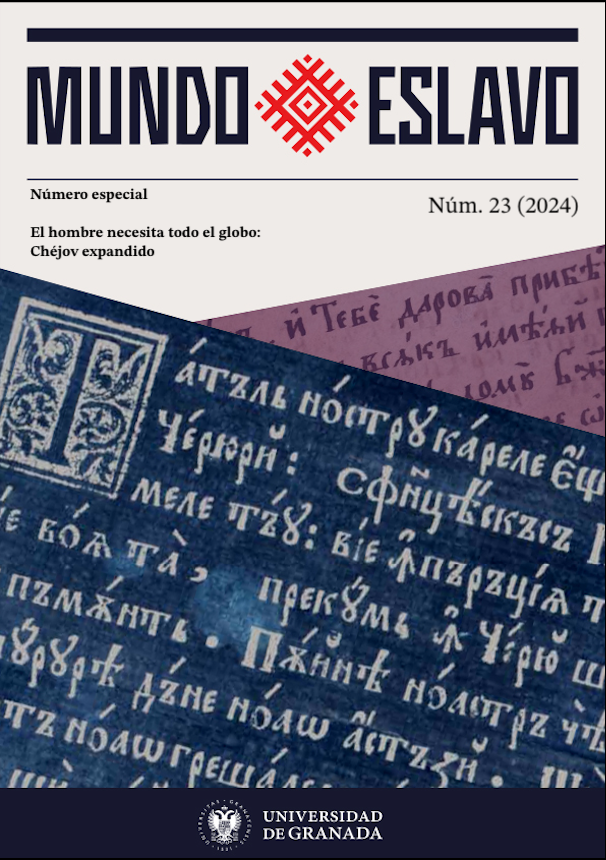The reception of Chekhov's theater during Franco's regime according to the archive of theatrical censorship of the General Administration Archive (1948-1978)
DOI:
https://doi.org/10.30827/meslav.23.31330Keywords:
Chekhov, theatre, reception, theatrical censorship, FrancoismAbstract
During Franco's regime, all theatrical works had to be authorized by the censorship in order to be performed, including Chekhov's theater, whose reception was consolidated in Spain in the 1960s. This article analyzes the censorship files of Chekhov's plays preserved in the General Archive of the Administration. On the one hand, it creates an overview of all the plays that were submitted to censorship between 1948 and 1978, which determines the periods of greatest presence of Chekhov's texts on the Spanish stage, and shows that the short comedies were the most performed and disseminated throughout Spain. Those responsible for this diffusion were the independent, university and school groups. On the other hand, the analysis of the censors' reports and opinions determines that censorship was not particularly severe with Chekhov's theater. It always authorized its representations and only caused slight objections to some of the moral transgressions of the characters.
Downloads
References
Abellán, M. L. (1980). Censura y creación literaria en España (1939-1976). Península.Acevedo, E. (29 de noviembre de1960). Los cien añitos. Pueblo.
Amiraghyan, H. (2023). Traducción y recepción del teatro de Chéjov en Cataluña en el siglo XXI. El caso de «ДядяВаня» [L’oncle Vània. Tío Vania]. [Tesis de doctorado, Universitat Pompeu Fabra] http://hdl.handle.net/10803/689884
Ascunce, J. A. (2015). Sociología cultural del franquismo (1936-1975). La cultura del nacional catolicismo, Editorial Biblioteca Nueva.
Bloin, B. (2007). Dido Pequeño Teatro de Madrid i la seva directora Josefina Sánchez Pedreño. Assaig de teatre: Revista de l’associació d’investigació i experimentació teatral, 59, 107-116, https://raco.cat/index.php/AssaigTeatre/article/view/146301/249687
de Blas, J. A. (2006). La guerra civil española y el mundo del libro: censura y represión cultural (1936-1937). Represura, 9, http://www.represura.es/represura_1_junio_2006_articulo2.html#_ftnref109
Gallén, E. (2013). Traducció i censura teatral sota la férula franquista dels anys cinquanta. Quaderns. Revista de traducció, 20, 95-116.
Gallofré, M. J. (1991). L’edició catalana i la censura franquista (1939-1951). Publicacions de l’Abadia de Montserrat.
García Sala, I. (2015). Traductores rusos en España: los Marcoff, un esbozo biográfico. Cuadernos Hispanoamericanos, 777, 42-53.
García Sala, I. (2017). La obra de Maxim Gorki vista por la censura franquista (1936-1978). Studi Ispanici, 42, 265-297.
García Sala, I. (2024). Anna Karénina, ¿moral o inmoral?Interpretaciones de la censura cinematográfica franquista. En García Sala, I., Ortega Sáez, M. y Zaragoza Ninet, G. Mujeres silenciadas. Traducciones bajo la dictadura franquista (pp. 161-180). Dykinson.
Gibert Pujol, M. M. (2013). Joan Oliver i el teatre breu de Txèkhov. En Bacardí, M., Foguet, F. y Gallén E. (Coord.) La literatura catalana contemporània: intertextos, influències i relacions. Institut d’Estudis Catalans, Societat Catalana de Llengua i literatura y Universitat Autónoma de Barcelona.
Gil Gascón, F. (2021). Censurar para evitar el peligro: las censuras cinematográficas durante el franquismo, 1939-1959. Ler Historia, 79, 17-38. https://doi.org/10.4000/lerhistoria.8880
Muñoz Cáliz, B. (2005). El teatro crítico español visto por sus censores [Tesis de doctorado, Universitat de Alcalá] https://www.bertamuñoz.es/teatrocensura.html
Muñoz Cáliz, B. (2006). Expedientes de la censura teatral franquista. Fundación Universitaria Española. Madrid.
Muñoz Cáliz, B. (2008) Los expedientes de la censura teatral como fuente para la investigación del teatro español contemporáneo. Teatro: Revista de Estudios Culturales / A Journal of Cultural Studies, 22, 25-38. https://digitalcommons.conncoll.edu/cgi/viewcontent.cgi?article=1226&context=teatro
Muñoz Cáliz, B. (2011). Mapa de la documentación teatral en España. Centro de Documentación Teatral.
Neuschäfer, H.-J. (1994). Adiós a la España eterna. La dialéctica de la censura. Novela, teatro y cine bajo el franquismo. Anthropos.
Pérez-Rasilla, E. y Soria, G. (2005). El teatro de Chéjov en España. Una historia que transcurrió despacio. ADE teatro: Revista de la Asociación de Directores de Escena de España, 104, 91-105.
Pérez-Rasilla, E. (2007). El proceso de cambio en el teatro español desde 1956. En García Tirado, A., Checa Puerta, J. E. (Coords.). 50 años de teatro contemporáneo: temática y autores (pp. 63-83). Ministerio de Educación y Ciencia, Secretaría General de Educación.
Sirera, R. (1975). L’hort dels cirerers, d’Anton Txekhov. Serra d’or, 181, 91. https://projectetraces.uab.cat/tracesbd/serrador/1975/serrador_a1975m6n189p91.pdf
Valdera, M. y Barros-García, B. (2020). Carrero Blanco ante la gran baza soviética: ideología y discurso. Historia Actual Online, 53(3), 151-166.
Vilches de Frutos, M. F. (1993). El Teatro Nacional de Cámara y ensayo. Auge de los grupos independientes (1960-1975). En Andrés Peláez, Historia de los teatros nacionales (1960-1985) (Vol. II, pp. 127-150) Centro de Documentación Teatral. https://digital.csic.es/handle/10261/77903
Downloads
Published
How to Cite
Issue
Section
License
Copyright (c) 2024 Mundo Eslavo

This work is licensed under a Creative Commons Attribution-NonCommercial-ShareAlike 4.0 International License.

CC BY-SA: This license allows reusers to distribute, remix, adapt, and build upon the material in any medium or format, so long as attribution is given to the creator. The license allows for commercial use. If you remix, adapt, or build upon the material, you must license the modified material under identical terms.
CC BY-SA includes the following elements:
BY ![]() – Credit must be given to the creator
– Credit must be given to the creator
SA ![]() – Adaptations must be shared under the same terms
– Adaptations must be shared under the same terms
Authors who publish with this journal agree to the following terms:
1. Authors retain copyright and grant the journal right of first publication with the work simultaneously licensed under a Creative Commons Attribution License that allows others to share the work with an acknowledgement of the work's authorship and initial publication in this journal.
2. Authors are able to enter into separate, additional contractual arrangements for the non-exclusive distribution of the journal's published version of the work (e.g., post it to an institutional repository or publish it in a book), with an acknowledgement of its initial publication in this journal.
3. Authors are permitted and encouraged to post their work online (e.g., in institutional repositories or on their website) prior to and during the submission process, as it can lead to productive exchanges, as well as earlier and greater citation of published work (See The Effect of Open Access).













